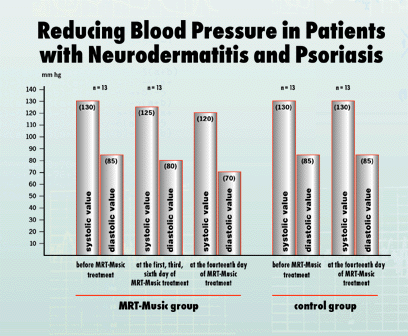The theme of investigation was in how far blood pressure could be reduced by Medical Resonance Therapy Music® on a short and long term basis. Out of 68 patients suffering from neurodermatitis and psoriasis two experimental groups and two control groups were formed. Experimental group 1 counted 28 neurodermatitis patients and experimental group 2 counted 20 psoriasis patients. The two control groups counted 10 patients each.
The age of the patients ranged from 18 to 60 years, the duration of the investigation was 2 weeks. Blood pressure was measured at the first, third, sixth and fourteenth day before and after treatment with MRT-Music®. At the beginning the average systolic value was 130 mm hg and the average diastolic value 85 mm hg in all four groups.
At the first day of treatment the average blood pressure in the experimental groups reduced from 130 / 85 mm hg before treatment to 125 / 80 mm hg after treatment.
This recurred at the third and sixth day of treatment. At the fourteenth day though blood pressure reduced from 130 /85 mm hg before treatment to 120 / 70 mm hg after treatment. Here a training effect became evident: with proceeding application the effectiveness of MRT-Music® treatment increased.At the first day of treatment the average blood pressure in the experimental groups reduced from 130 / 85 mm hg before treatment to 125 / 80 mm hg after treatment.
In the control group no changes could be observed.
Investigators:
Dr. med. Lazaroff
Dr. med. Shimshoni
